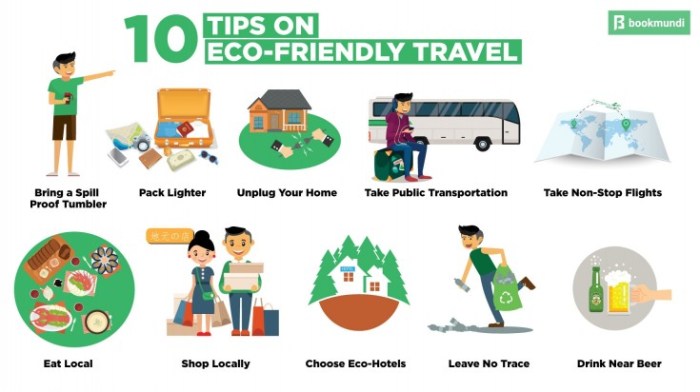As eco-friendly travel tips take center stage, this guide beckons you into a world of sustainable adventures. Embark on a journey where every step treads lightly on the planet, leaving a legacy of responsible exploration.
Discover how to choose eco-friendly transportation options, select accommodations with green practices, engage in responsible activities, manage waste effectively, make sustainable food choices, and pack essentials that minimize your environmental impact.
Sustainable Transportation
Embracing eco-friendly transportation options is crucial for responsible travel. Walking, biking, and utilizing public transport significantly reduce carbon emissions and promote a healthier lifestyle.
When planning your itinerary, consider destinations accessible by foot or bike, reducing the need for motorized transport. Additionally, research local public transport systems and incorporate them into your travel plans to minimize the environmental impact.
Choosing Eco-Friendly Transportation
- Walking: A zero-emission mode of transport that promotes fitness and allows for a deeper exploration of your surroundings.
- Biking: Another emission-free option that provides a fun and healthy way to navigate cities or explore natural landscapes.
- Public Transport: Buses, trains, and subways offer a convenient and environmentally friendly way to travel, reducing individual carbon footprint.
Accommodation Choices: Eco-friendly Travel Tips

Accommodation plays a significant role in the environmental impact of travel. Choosing eco-friendly accommodations can reduce your carbon footprint, conserve water and energy, and support sustainable practices.
Types of Eco-Friendly Accommodations
Various types of eco-friendly accommodations are available, each with its unique characteristics and advantages. Here’s a comparison table:
| Type | Key Features | Examples |
|---|---|---|
| Eco-Lodges | Located in natural settings, prioritize sustainability, offer unique experiences. | The Nature Conservancy’s lodges, Inkaterra Machu Picchu Pueblo Hotel |
| Green Hotels | Incorporate sustainable practices into operations, certified by organizations like LEED or Green Key. | Kimpton Hotels, Marriott’s AC Hotels, Hilton’s Canopy by Hilton |
| Sustainable B&Bs | Small-scale, locally owned, emphasize local culture and environmental responsibility. | Barnard Castle in England, Woodleaf Farm in North Carolina |
| Vacation Rentals | Can be eco-friendly if they adhere to sustainable practices, such as energy efficiency and waste reduction. | Airbnb Plus, Vrbo Green, Green Key Vacation Rentals |
Tips for Finding and Booking Sustainable Accommodations
To find and book eco-friendly accommodations, consider the following tips:
- Look for certifications: Look for accommodations certified by reputable organizations like LEED, Green Key, or EarthCheck.
- Read reviews: Check online reviews to see what previous guests have said about the accommodation’s sustainability practices.
- Contact the accommodation directly: Ask about their specific sustainability initiatives and practices.
- Consider location: Choose accommodations that are located near public transportation or offer alternative modes of transportation.
- Book directly: Booking directly with the accommodation rather than through online travel agencies can help support local businesses and reduce commissions.
Responsible Activities
The activities we engage in while traveling can significantly impact the environment and local communities. By choosing responsible activities, we can minimize our ecological footprint and support sustainable tourism practices.
When selecting activities, consider their environmental impact. Opt for nature-based experiences that promote conservation and minimize disturbance to wildlife. Choose tours led by local guides who can provide insights into the region’s ecosystem and culture.
Wildlife Conservation
- Support organizations involved in wildlife conservation efforts.
- Participate in guided tours that prioritize animal welfare and respect wildlife habitats.
- Avoid activities that involve direct contact with wildlife or disrupt their natural behavior.
Nature Tours
- Choose tours that focus on sustainable practices and minimize environmental impact.
- Support tours that promote local businesses and provide employment opportunities.
li>Opt for walking or biking tours to reduce carbon emissions.
Supporting Local Communities
- Engage with local artisans, craftspeople, and businesses to support the local economy.
- Learn about local customs and traditions to promote cultural understanding.
- Participate in community-based projects that benefit the environment and local livelihoods.
Waste Management

Proper waste management is crucial for preserving the environment while traveling. By reducing, reusing, recycling, and composting, we can minimize our impact on destinations and support sustainable practices.
To minimize your environmental impact while exploring new cultures, consider incorporating eco-friendly practices into your travel plans. For instance, opt for local transportation or walking instead of driving. While in Europe, immerse yourself in the region’s rich history and heritage through cultural tours.
These tours often showcase local traditions, art, and architecture while promoting sustainable tourism practices.
Reducing waste starts with conscious choices. Opt for reusable items like water bottles, coffee cups, and shopping bags instead of single-use plastics. Biodegradable packaging is another eco-friendly alternative to minimize waste.
Waste Reduction Tips
| Category | Tips |
|---|---|
| Beverages | Carry a reusable water bottle and coffee mug |
| Food | Pack snacks in reusable containers |
| Shopping | Bring your own reusable shopping bag |
| Hygiene | Use biodegradable toothbrushes and floss |
| Packaging | Choose products with minimal or biodegradable packaging |
Recycling and composting practices vary across destinations. Research local regulations and find designated bins or facilities for proper waste disposal. By following these best practices, we can contribute to waste reduction and support sustainable tourism.
Food Choices
Food production and consumption have a significant impact on the environment, contributing to greenhouse gas emissions, water depletion, and deforestation. By making sustainable food choices, we can reduce our environmental footprint while supporting local communities and promoting healthy eating habits.
When planning your next luxurious getaway, consider incorporating eco-friendly travel tips to minimize your environmental impact. From choosing sustainable transportation options to opting for eco-conscious accommodations, there are many ways to travel responsibly. While exploring top luxury travel destinations , remember to pack reusable items, conserve water and energy, and support local businesses that prioritize sustainability.
By making these small changes, you can enjoy an unforgettable vacation while preserving the beauty of our planet for future generations.
Local Produce, Eco-friendly travel tips
Choosing local produce reduces transportation emissions and supports local farmers. Look for fruits and vegetables grown in your region, often available at farmers’ markets or local grocery stores.
Plant-Based Meals
Animal agriculture has a high environmental impact due to methane emissions, water consumption, and land use. Incorporating more plant-based meals into your diet, such as fruits, vegetables, legumes, and whole grains, can significantly reduce your carbon footprint.
Reducing Food Waste
Food waste contributes to greenhouse gas emissions and resource depletion. To reduce food waste, plan meals ahead, store food properly, and compost organic waste.
When planning an eco-friendly vacation, consider activities that minimize environmental impact. For thrill-seekers, extreme sports vacations offer an adrenaline rush while immersing you in nature’s beauty. From rock climbing to kayaking, these activities often take place in pristine environments, promoting appreciation for their preservation.
After your adventure, opt for eco-lodges that prioritize sustainable practices, reducing your overall carbon footprint.
Supporting Local Farmers
Supporting local farmers ensures a sustainable food supply chain while preserving agricultural traditions and rural communities. Visit farmers’ markets, join community-supported agriculture (CSA) programs, or purchase directly from local farms.
Packing Essentials
Packing light and choosing eco-friendly products are crucial for sustainable travel. It reduces transportation emissions, minimizes waste, and supports local businesses offering sustainable options.
Consider using reusable containers, bags, and utensils instead of single-use plastics. Opt for products made from sustainable materials like bamboo, cork, or recycled fabrics. Remember, every small step towards reducing your environmental impact matters.
Suggested Packing List for Eco-Conscious Travelers
| Category | Eco-Friendly Options |
|---|---|
| Clothing | Natural fabrics like cotton, linen, bamboo, or hemp |
| Toiletries | Reusable containers, biodegradable soap, shampoo bars |
| Footwear | Shoes made from recycled materials, organic cotton, or vegan leather |
| Accessories | Reusable water bottle, sunglasses made from recycled plastic, reusable cutlery |
| Electronics | Energy-efficient devices, chargers made from recycled materials |
Conclusion

Embrace eco-friendly travel tips and become a conscious traveler. By adopting these practices, you not only reduce your carbon footprint but also contribute to preserving the beauty of our planet for generations to come.
Quick FAQs
What are the benefits of choosing eco-friendly transportation options?
Eco-friendly transportation options, such as walking, biking, and public transport, reduce carbon emissions, conserve fuel, and promote physical activity.
How can I find and book sustainable accommodations?
Look for accommodations with eco-friendly certifications, such as LEED or Green Key, and check their websites for information on their sustainability practices.
What are some examples of eco-friendly activities and experiences?
Eco-friendly activities include wildlife conservation projects, nature tours that minimize environmental impact, and visiting local markets to support the community.